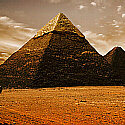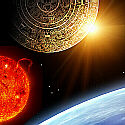Nations
The Biblical View of the Nations
The prophecy of Daniel contains an impressive outline of the rise and fall of empires, and of the state of the nations in what used to be called “the civilised world” – that is, the nations of Europe, the Middle East, Egypt and the North African coast, all surrounding the Mediterranean Sea. The prophecy was uttered when Daniel was captive in the court of Babylon, in the 6th century BC. Its truth has been demonstrated in history from that day to the present time.
Nebuchadnezzar, king of Babylon, full of his own pride and glory, saw in a dream a great image of a man, made up of five parts:
The head of the image was of gold. Its breast and arms were of silver. Its belly and thighs were of brass. Its two legs were of iron. But the feet and toes were composed of a mixture of iron and clay. Then a stone appeared, “cut out of the mountain without hands”. It fell upon the feet of the image, brought it all crashing to the ground, and then ground into powder all its elements, so that the wind swept them away. The stone then became a great mountain and filled the whole earth.
Nebuchadnezzar was much troubled by the fate of this image, for none of his wise men could tell him what it meant. He sent for Daniel, the prophet, to interpret the dream:
So Daniel explained the meaning of the image. The head of gold represented the dominion of Nebuchadnezzar himself. It was to be succeeded by another, inferior kingdom (the breast and arms of silver); and that in turn by a third (of brass); then the fourth kingdom (the legs of iron) was to be strong and violent, but the feet and toes represented divided kingdoms, “partly strong and partly broken” (vv. 37-42)
One thing is clear: this image represented a succession of powerful kingdoms, and it is not hard to identify them. The first we know: it was the empire of Babylon. In Daniel chapter 8 (vv. 20-21) we are told that the successors were to be Persia and Greece. The fourth power, “great and terrible”, is not explicitly named in Daniel’s prophecy. History abundantly verifies these predictions. About 530 BC the Babylon power was overthrown by the Medes and Persians, who eventually established the Persian Empire. It lasted for 200 years, and was then overthrown about 330 BC by Alexander the Great who set up the Empire of Greece.
What great power succeeded the kingdoms of the successor of Alexander? There can be no doubt about the answer: it was the Empire of Rome. The Romans invaded the territories of the former Greek Empire from the 2nd century BC onwards. In the next 500 years Rome became the greatest power on earth. Its Empire covered practically all the territories of the first three, and spread far and wide into Europe, the Middle East, and all the countries surrounding the Mediterranean. Its conquests were carried out with ruthless efficiency, well symbolised by the description, “strong as iron”. In the last two centuries of its existence it was divided into two parts: the Western Empire, based on Rome, and the Eastern, based on Constantinople – the two “legs” of the image.
A God that Revealeth Secrets
But what happened after the break-up of the Roman Empire in the 5th century AD onwards? It was not replaced by another great empire – there has in fact never been a fifth empire of comparable dominion, despite the efforts of ambitious men to establish one. The territory of the Roman Empire broke up under the attacks of the barbarian tribes of Huns, Goths, Visigoths and Vandals, who formed separate kingdoms of their own. The nations of the present day Europe are the successors of these kingdoms. Throughout their history of 1500 years to the present day, those nations have remained in a divided state, well symbolised by the image’s feet, part iron and part clay: “partly strong and partly broken . . . they shall not cleave one to another” (Daniel 2:42-43).
How could Daniel have known that the great dominion of Nebuchadnezzar would be succeeded by three others, the fourth being exceptionally strong, but would never be succeeded by a fifth? How could he have known that after the fall of the fourth, its empire would disintegrate into divided States, with little unity between them? Of course, of himself he could know no such thing, nor could any other man. But Daniel does not leave us without an explanation:
There is a God in heaven that revealeth secrets . . . The great God hath made known to the king what shall come to pass hereafter: the dream is certain and the interpretation thereof sure
How else can you explain that the prophecy of Daniel chapter two should be in existence centuries before Christ, and yet contain a forecast of the course of Empires and nations accurate right up to the present day, well over 2000 years ago? If there is indeed “a God in heaven”, you can understand it. Without Him, there is no explanation.
We shall comment in the concluding section on the last phase of the image vision, when the stone strikes the image on the feet and brings it all down. But for our final prophetic example we turn to our own times.
Our Own Times
Although their fulfilments have extended right up to the present day, the prophecies so far considered have concerned events long in the past (with the exception of the recent regathering of Israel to their ancient land). Has Bible prophecy anything to say about modern times, as a guide to us in these days?
Indeed it has: and what a contrast it makes with the confident expectations of human thinking! The 19th century was an age of optimism. Great developments were taking place. Increased scientific knowledge led to rapid technical progress, bringing greater industrial production. This in turn meant more wealth (though not for the poorest people). Education was being made available to all sections of society, and beneficial results were confidently expected. Better educated people would take more interest, it was argued, in arts like literature, music and painting. The general moral tone of society would be improved. Politicians promised a new social order of justice and equality for all. As people became better off, they would cease to envy one another. “Banish poverty, and you’ll banish crime” was the slogan. When the finest powers of the human mind were developed, peace would be established among the nations. Church leaders confidently looked forward to the spreading of the Gospel all over the world. Human progress and improvement, both in individuals and in society, were taken for granted. The future was bright.
Peace and Progress?
What a shock the events of the 20th century have been! The dream of progress and peace has faded. Two terrible world wars, with millions of slain and untold damage and suffering, have been followed by the development of the mostly frightfully destructive weapons ever invented. The varying solutions in which the “wise men” of the 19th century put their trust have all been exposed as false. More widespread education has not been followed by higher moral standards, but by a growth in dishonesty, greed, violence and crime. The Christian religion, far from converting the nations, is in decline all over the earth. Democracy in politics has not proved the magic cure for social evils that was expected. Finally – cruellest blow of all – science has proved a frighteningly double-edged weapon. Far from being an era of peace, this “civilized” 21st century has become an age of strife and violence. No wonder the attitude of so many people is one of pessimistic resignation. There seems little any one can do.
Now what has Bible prophecy to say about all this?
It has a clear forecast of the “last days”, “the time of the end”, when the career of mankind in the earth will come to a critical point. It is not a picture of continuing progress and peace, but rather of world trouble and fear. The clearest and most striking example of this is found in what Jesus says to his disciples, when they asked him what would be the sign of his return to the earth and of “the end of the world”. He tells them first about the fate of the Jewish people:
They (the Jews) shall fall by the edge of the sword, and shall be led away captive into all nations: and Jerusalem shall be trodden down of the Gentiles (the nations), until the times of the Gentiles be fulfilled (Luke 21:24).
Now this is a brief description of what we have already considered in prophecy concerning Israel. The Jews were to be driven as captives into all nations: Jerusalem was to be subject to Gentile powers. Note that Jesus implies a limit to this: “until the times of the Gentiles be fulfilled”. We have seen the beginning of this in our own days: Jerusalem is no longer dominated by “foreign” powers – it is under the control of Israel itself.
World Distress and Fear
So what he says next must also apply to the same days – the days of Israel’s restoration to their own land; This is what he foretells: And there shall be signs in the sun, and in the moon, and in the stars; and upon the earth distress of nations with perplexity; the sea and the waves roaring; men’s hearts failing them for fear, and for looking after (for expectation of, R.V.) those things which are coming on the earth: for the powers of heaven shall be shaken (vv.25-26).
This is no picture of peace and progress. It is a world of distress and perplexity, of fear seizing men’s hearts as they contemplate the events taking place on “the inhabited earth” (as the word Jesus used literally means).
The Apostle Paul, writing about 35 years after the time of Jesus` prophecy, has this to say about the character of the last days:
. . . In the last days there will come times of stress. For men will be lovers of self, lovers of money, proud, arrogant, abusive, disobedient to their parents. ungrateful, unholy, inhuman, implacable, slanderers, profligates, fierce, haters of good, treacherous, reckless, swollen with conceit, lovers of pleasure, rather than lovers of God, holding the form of religion but denying the power of it . . . (2 Timothy 3:1-5).
This is an astonishing picture of a civilization; mankind is throwing off all restraint and indulging its own desires, reckless of consequences. Its uncanny resemblance to the developments in our own world cannot be denied.
So this is the position: whereas the “wise men” of only 100 years ago were confidently anticipating an era of progress and peace for the nations of the world, the Bible, in the words of Jesus and Paul, was foretelling a world of distress, fear, and perplexity, an age of violence, self-indulgence and hatred. Our human philosophers were wrong; Jesus and Paul were right. But they spoke and wrote over 1900 years ago! How could they have known? Only because neither of them spoke his own words, but the words of God Himself. It was God who knew, and inspired His Son and His apostle to reveal the character of the last days.
Putting it Together
There are certain important conclusions to be drawn from our consideration of these Bible prophecies.
If the Bible has proved to be so right in its predictions about events in human history – the fates of Babylon, Egypt, and Israel, as well as the rise and fall of empires, and the state of the modern world – is it not just as likely to be right in its predictions of events which have not yet come to pass?
Take that image vision in Daniel, for instance. We have not so far commented upon the final development: the stone, “cut out of the mountain without hands”, smote the image on the feet, destroyed it, and then itself “became a great mountain, and filled the whole earth” (Daniel 2:35). Now the general sense of this is plain: a new element not part of the image empires and kingdoms, destroys them and takes their place in the earth. And since “without hands” must mean “without human hands” the stone must represent no ordinary human power.
But Daniel tells us himself what it means: In the days of those kings (that is, the various kingdoms that followed the Roman Empire) shall the God of Heaven set up a kingdom, which shall never be destroyed . . . it shall break in pieces and consume all these kingdoms, and it shall stand for ever (v.44).
The present governments and powers of the world are to be removed, in a sudden dramatic event, when God intervenes and sets up His own government. To avoid misunderstanding it should be said that it is not the populations of the earth who are to be destroyed: it is the power and authority of their human governments, to be replaced by the new Kingdom of God. Many other prophecies tell us of the nature of this Kingdom; the uprightness of its rule, the truth of its teaching, and the peace it will at last bring to mankind through their recognition of “the God of heaven”. Read for instance Isaiah 2:1-4 for a clear and striking picture of the nations in that age to come.
But how exactly is this great change in the earth to be accomplished? The New Testament tells us. In fact Jesus himself tells us in that prophecy of times of trouble and fear for all nations. His next words are these: Then shall they see the Son of Man coming in a cloud with power and great glory (Luke 21:27)
He is saying that he will come back himself. The return of Christ to the earth is a frequent theme in the teachings of Jesus and the apostles in the New Testament. They agree completely with the prophets. Read Psalm 72 for a picture of his reign.
Now this surely is what should concern us: if the prophecies of the Bible about nations and empires have proved so true over a period of more than 2000 years, are not those other things they predict also likely to come to pass? Is it not unreasonable to say: “Well, I accept that the prophets were right in their predictions in these historical matters, but I can’t believe what they say about the future for us.” Why not? They have given evidence that they were setting out not their own ideas, but the very purposes of God. Whatever else they say must surely claim from us all the most careful attention.
The Vital Element
But of course there is more. These remarkable prophecies are found in the Bible, and nowhere else in the world. There are no other writings, no other books, no other human pronouncements which can even begin to compare with the Bible. But the Bible tells us that Jesus was the Son of God; the things he said are preserved for us in the Gospels of the New Testament. Together with the teachings of his inspired apostles Peter, John and Paul, they reveal to us truths we cannot know otherwise. They warn us of the reality of death; they explain why the Gospel is “the good news”, “the power of God unto salvation” (Romans 1:16). They encourage us with the promise of a lasting life in the new order which Christ will establish when he comes. That is why we ought to be reading the Bible. It can make the vital difference to us between the hopelessness of death and the confident hope of everlasting life.
Careful reading of the Bible will convince us that God exists, that He is in control, and that He calls us to be disciples of His Son. The Bible is the book for us . We do well to pay attention to what it says.





